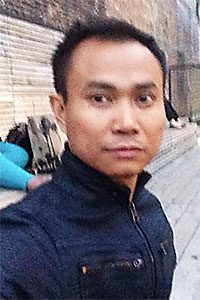
Are the powers that be threatened by a rap song? This question came to mind on Friday after finding out how the police and the government had reacted to the song, <i>Prathet Ku Mee</i> (What My Country's Got) by young all-male Thai rappers, Rap Against Dictatorship. It prompted me to check out the video on YouTube. Since then I've kept replaying it. I've also got an answer.
The song amplifies just how sick, abnormal, hypocritical, submissive, ignorant and fearful Thai society has become, under military rule since the 2014 coup in particular, and since the political conflict broke out more than 10 years ago.

Surasak Glahan is Deputy Editorial Pages Editor, Bangkok Post.
The lyrics seem to have struck a nerve with the police and government. Why? The authorities must fear its honest reconstruction and summing-up of several buried and soon-to-be-buried facts about Thailand's political history, many of which case those in power in a negative light. They fear that people, especially youth, will become fed up with the status quo and that the state propaganda will eventually fail its ultimate purpose of rewriting and dictating the political narrative.
In return, they have started to deny the facts, or reinforce the Thai culture of denial, with the police doing a laughable job of threatening the rap group with legal action for entering "false information into a computer system", a violation that could theoretically land them in jail for years. The same threat has been extended to anyone who shares the clip.
Government spokesman Buddhipongse Punnakanta on Friday said the government is sad and disappointed because the song damages the country's reputation.
An established and well-known rapper, Oui Buddhabless, yesterday slammed the group for their "novice political views" and "legal violations". The senior rapper, who obviously supports the regime, denied freedom of expression should be limitless, instead saying there should be a boundary beyond which one should not cross.
What's happened in the past few days reminds me of Auschwitz holocaust deniers who ignore obvious facts about the genocide of Jews by the Nazis during World War II by, as described on the website Auschwitz.org, minimising the dimensions of genocide and trivialising and rationalising it by claiming it was an acceptable wartime practice.
While the song's lyrics depict the Thailand of the post-2006 and 2014 coup eras, its video uses a backdrop which reconstructs a historic scene of a man striking a dead body, hung on a tree at Sanam Luang in Bangkok, with a folding chair while bystanders cheer and laugh. This incident occurred as part of the massacre of student protesters on Oct 6, 1976, when the police and right-wing militia laid siege and attacked students at Thammasat University.
Governments ever since have formally declined to recognise the existence of this massacre by not having it included in school textbooks.
In fact, the political conflicts of past years might have been less ugly and disorderly had we embraced and learned from this and other chapters of modern Thai history. And society may also find a way out of this limbo if it starts talking straightforwardly, openly, matter-of-factly and honestly about what has happened over the past 12 years and why.
These young rappers' song has done that job perfectly, weaving together the fabric of our social and political woes. With raw rage, moving rhythm and catchy rhymes, it provokes a storm among viewers. Its narrative of a country which has tolerated failed, corrupt and distorted justice, political and legislative systems is truthful. It touches upon a culture of ignorance to injustice and inequality and a lack of consciousness among the populace and their rulers.
The song lists many more political facts that can either pinch, sadden, empower or irritate you (depending on whether you accept or deny the facts). It contains no false information, as claimed by deputy police chief Srivara Ransibrahmanakul, and so surely cannot violate the Computer Crime Act.
Given how politically powerful the song is, it is no surprise that the powers that be feel threatened.
Thanks to the police threat, the song has become popular overnight. It represents the voice of our young, the 7 million who will be first-time voters and the deciding factor in an upcoming general election next year. And those current rulers who aspire to prolong their power have every reason to be fearful of this truthful and provocative political narrative.
